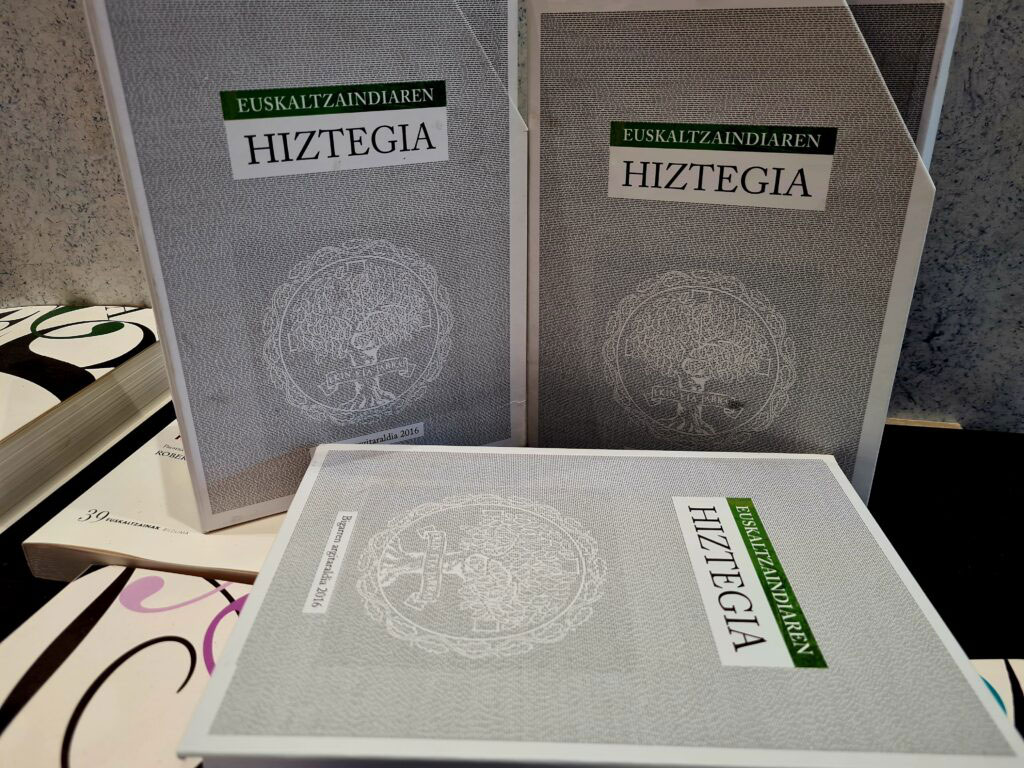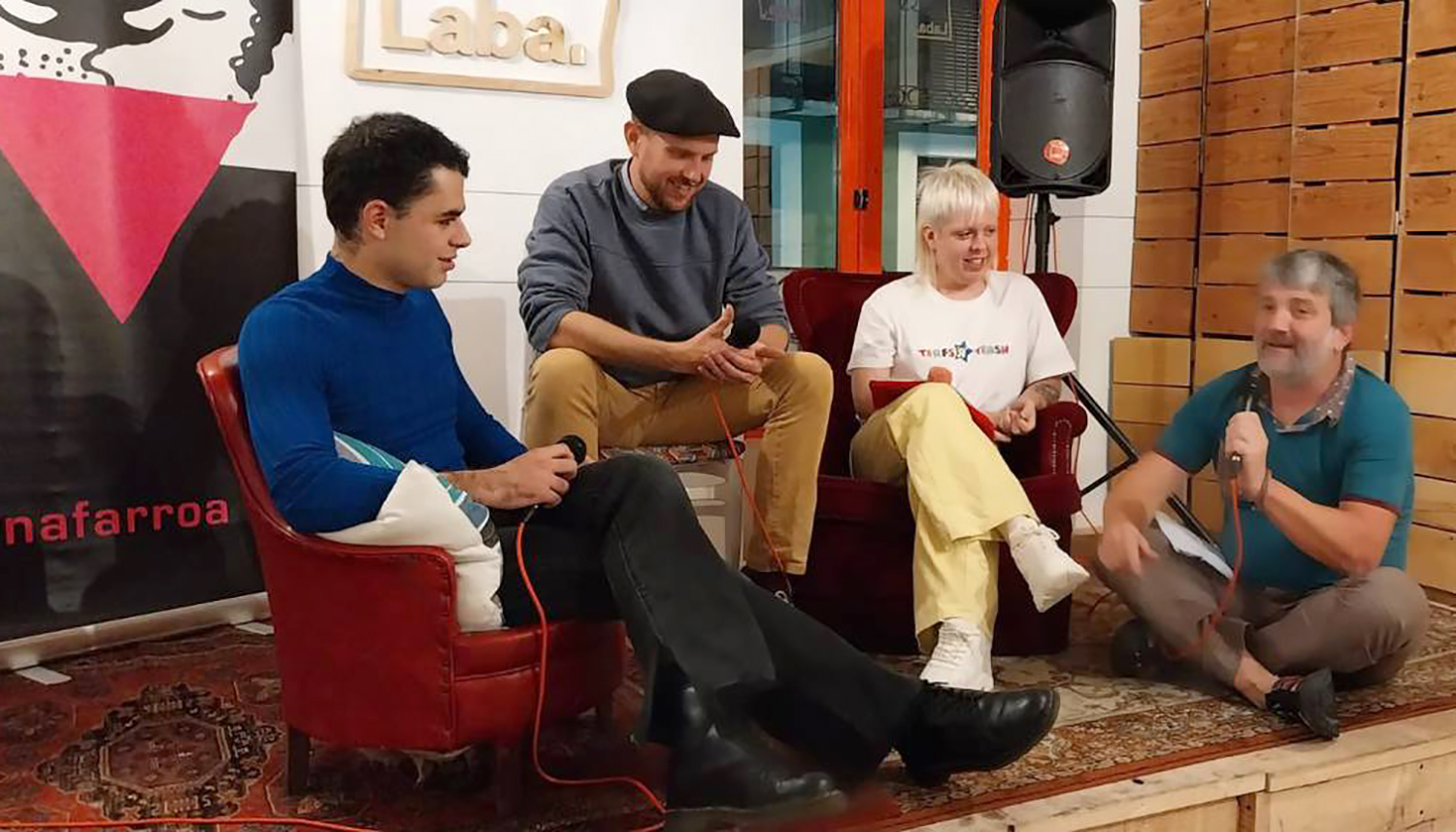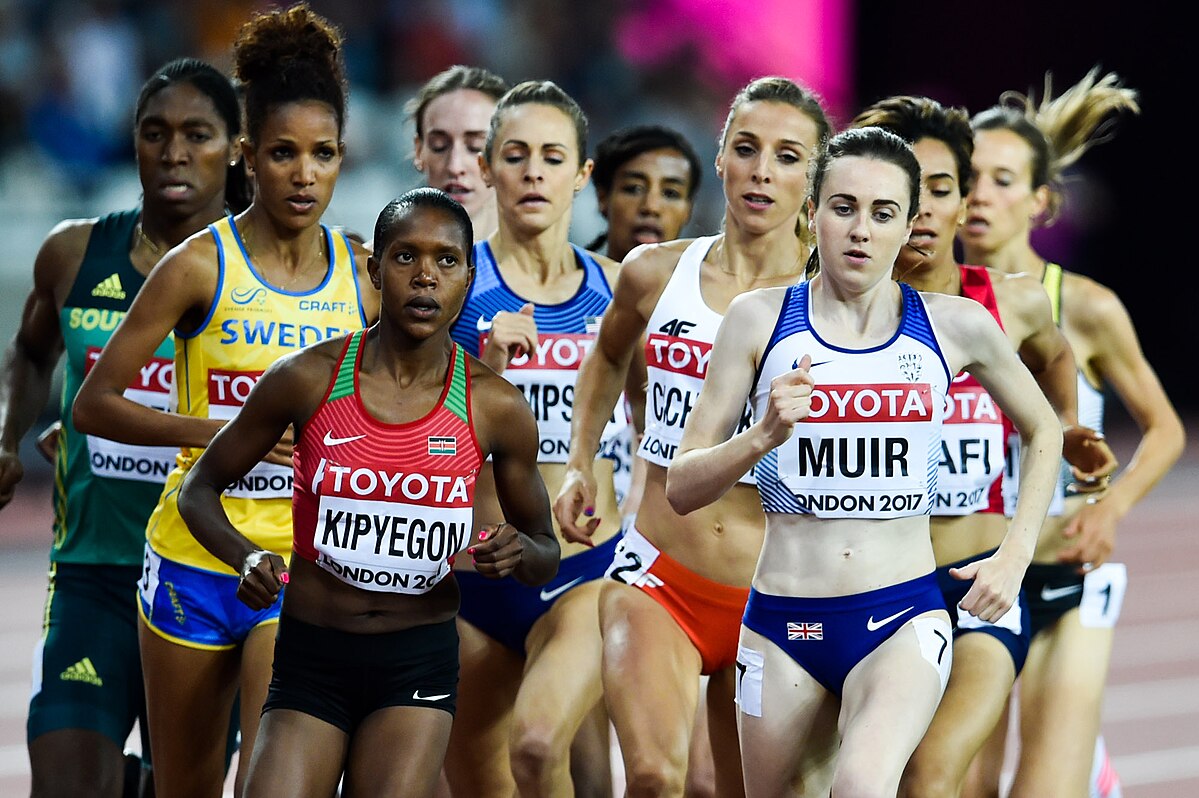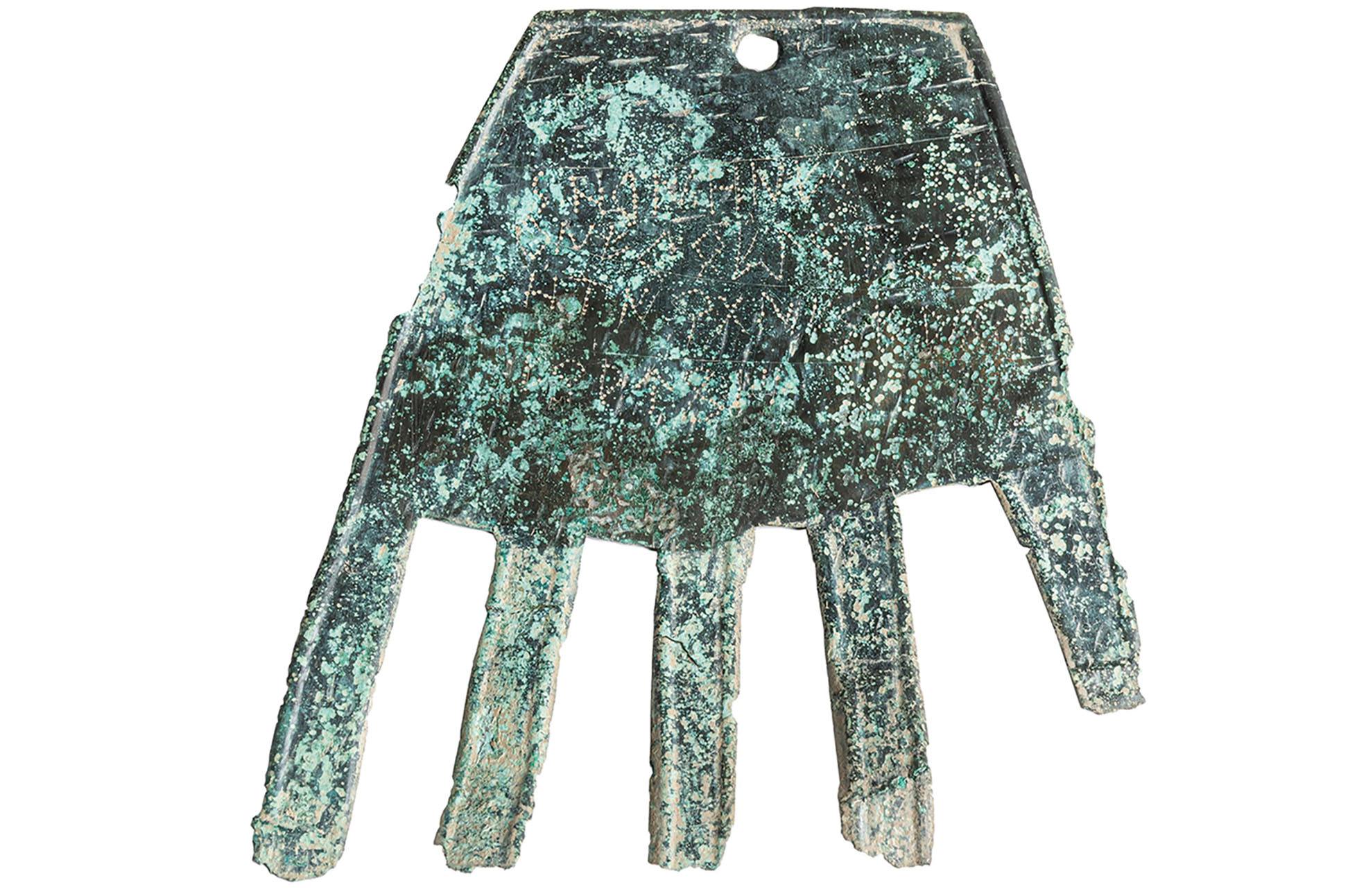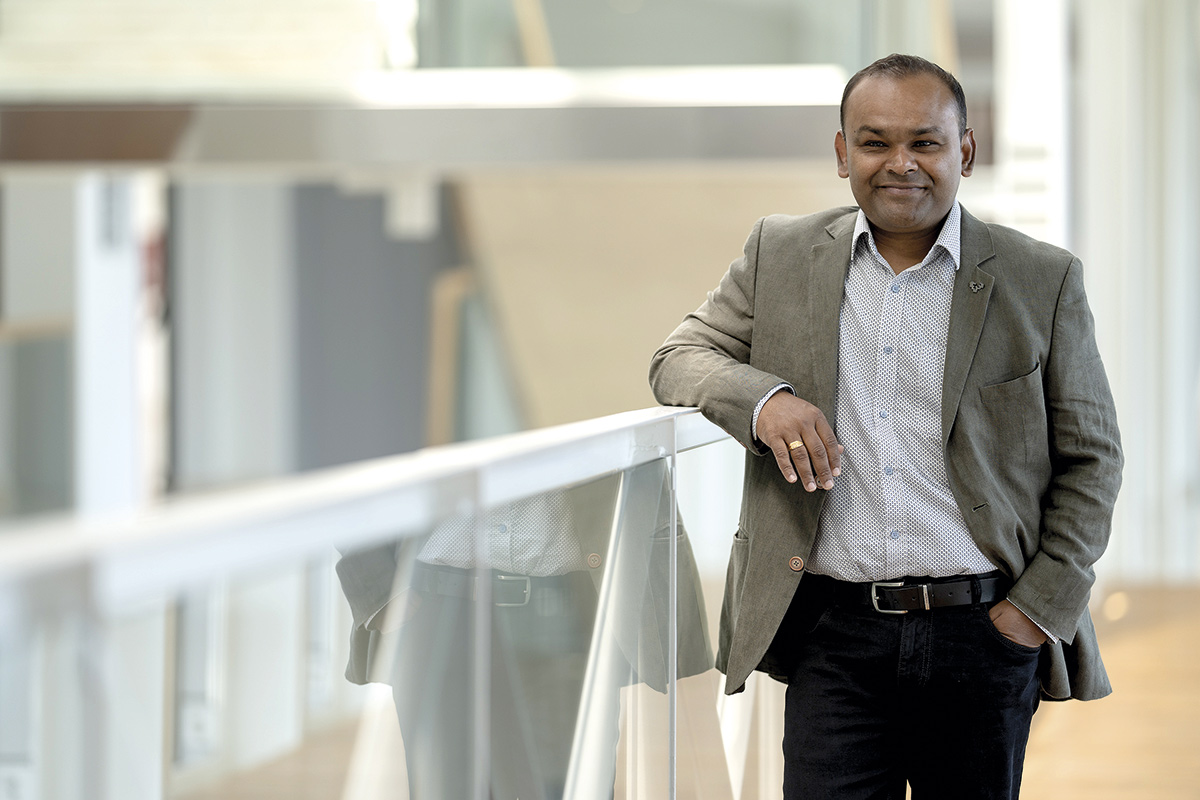"Immaterial heritage is absolutely necessary to see where we come from and where we can go."
- Urtzi Etxeberria, from Itsasondo, began to analyze the roots of English and Basque with love for languages. After studying linguistics at the University of the Basque Country, he came to Baiona to take the position of director of the IKER research center. At the Gaztelu Berri workshop in the working capital, we used the interview to ask ourselves about the world of researchers, the Basque Ethnopolis and other issues.

Urtzi Etxeberria, what is the IKER center?
IKER is a text research centre in Basque and Basque. It has three legs, the CNRS Centre in France the first, the University of the Peoples of Pau and the North of Aturri (UPPA), and the University of Montaigne in Bordeaux. What we researched at the base is Euskera as a language, in the broad field of the linguistic term. Therefore, on the one hand we formally study the same language, then in the field of sociolinguistics, we also study texts and literature. Eight researchers are working, in addition to an emeritus, and we teach the licensors and master's degrees from here; then we have two lecturers at Pau. In total, a dozen people work, plus three or four who contribute to research. Doctors and master's students have also visited us from time to time, both from Euskal Herria and from France.
There are no centers like IKER that study Euskera, what is special about it?
Yes, IKER is the specialty around the Basque Country. On the one hand, it is the only centre in France, created in 1999, and it is not usual to find such a centre around a language. There was a time when a force was made in the first section of Basque studies of Montaigne, under the influence of Jean Haritschelhar and it can be said that this path has come to good.
How does a young man from Itsasondo get to take the job of research and drive to IKER?
As in many lives, I believe that chance also influences my own. From a certain age on, I liked language and English entered philology in Vitoria. When I finished, in the fourth grade, I was asked if I'd like to do a Ph.D. in linguistics. Without knowing very well what was going on, I accepted the idea and did some years in it, doing the thesis, being a year out. When I finished in 2005, I got a postdoctoral scholarship from the Basque Government, here, to conduct an IKER study. I accepted the proposal, which was close to my house and was a place I liked. Then in 2006, I introduced myself to a position that was created at the CNRS, and at that point the stars were put in the right place and I was touched. Since then I'm very comfortable here, we have a good working environment and you don't always have to work on something you like, so I'm happy to tell you the truth.

What is your field of research and what are you working on right now?
I'm working on the specific section that investigates the meaning of language, that is, when someone throws a phrase, how we interpret it or understand it, in the section of pragmatic semantics. For example, I study how we interpret someone/nothing in Euskera and other particles of this kind, in what context they appear and what forces them to interpret them in one way or another. Lately, through experiments, we've looked at how these particles are understood. For example, instead of asking a person directly, we set up a context or an image situation and asked about their interpretation. We are preferably selecting people who are not linguists so that they do not have behind them a knowledge that can provide an answer. The results are always interesting to us. Another field related to semantics and pragmatics is the one that we are researching with children and adults with autism disorders, to see how those interpretations and understanding look, is ambiguity, how they interpret metaphors, irony.
The Basque Country, is it analyzed out of here?
Yes, no doubt. In fact, the first question to be asked is where the Basque country comes from... But we don't work on it. As a base we can say that the first premise we take is that it's something we have in the brain. To the extent that this is the case, the abilities of a child here to learn are the same as those of an African Ethiopian. Therefore, in this context, it is not our line of work that the Basque country is by itself, but we analyze what it contributes when compared or researched with other languages. The truth is that these environmental works no one has ever exposed them at an international level, at international conferences we explain what happens to these modes in our language and we mention what this shows with respect to other languages or how we should interpret it, we observe the similarities, if it is something universal in the brain, what are those similarities. The truth is that Euskera has been taken very well, both because of its historical and mysterious aspect and because of the possibilities of comparison that Euskera formally contributes to research.
You are participating with EKE in the working group of Euskal Etnopoloa. What is your work?
The Ethnopolo is a label that analyzes the different forms of expression that exist around the Basque Country and the Basque culture, including dance, art, music and, of course, the Basque Country. As for our participation, in recent times we have organized lectures for the general public, to show that we do things of interest and general knowledge, to make reference and publicize the research we carry out at the IKER center. In addition, it may also be to request projects or to collaborate with some reports and to carry out such work.

What is your opinion of immaterial heritage?
I think it's necessary to see where we come from and where we can go, but it's not only that, it's also important to store things, to create a warehouse. In the laboratory we have several projects on Euskera, such as the one carried out with the Norantz project, to see the meaning of Euskera and record it around concrete questions. This was how the Euskera of the Euskaldunes was collected from around 70 years old and below to the Euskera of the young, and then we looked at the changes. We can use it for research, but it's also interesting to collect it as a heritage site. In another project we collected in Ipar Euskal Herria the Basque of the places that were in contact with the gas con or the biarnesa; receiving that has an interest, if only to show that it existed at a given moment. At the same time, I believe that on this issue of globalisation we do not have many years left to keep some things, I believe that it is time to do projects of this kind, because I fear that in a moment we will regret not having received some things and that they have disappeared. I don't want to be negative, but keeping is absolutely important. We in the laboratory are strong in this respect, we all take that step, that is to say, receive, archive or create a database... The idea that's been created recently is Basque Archive, to collect all the data and then be there, for anyone who wants to see or analyze.
Can researchers be considered treasure seekers? Is it like the treasure of the Dauphiné?
It is true that the discovery made with the boat Le Dauphin was very nice. By 2008, a Vitoria history researcher, Xabier Lamikiz, called Rikardo Etxepare, the first director of the city, telling him that he had found a real treasure. From the ship Le Dauphin, which linked the French lands with the coast of Quebec, he wrote letters in Euskera, letters that he found in the national archive of London about 1757 years ago. I remember when the discovery was made, a group of researchers here went to get our hands dirty in the London archive. It was a lot of boxes, the envelopes that no one would open you, I don't know who I don't know who you sent, the ones that never came and opened, it's not something that happens every day. It was a real treasure. The information about the letters was published in the journal Lapurdum. It was and still is very nice, as we have other projects around it. In fact, what these letters show is not only that at that time the Basque was written, but that to read the Basque of that time, at that time they used Euskera among the families to write the letters, the different references that existed at the time; you can take a lot of things out of there, it is very interesting.

What is the research world in the Basque Country?
Living from research is not rex. I was lucky enough to take the opportunity to do research, because there are few possibilities, here and in the south. You have proposals to be a university professor or to work in the Ikerbasque foundation that has been created in the south, but there are not many positions. In France there is this annual competition from the CNRS, but it takes few jobs and is known internationally, so it is an important competition for few jobs, it is not getting those rex.
Then I think from a health point of view the research department is not bad. To give an example, the UEU organizes every two years a major conference entitled IKER Gazte to bring together researchers from different areas of Euskal Herria and show their research. Two years ago we organised these meetings in collaboration in Baiona and they were very successful. So, if there is a desire, there are people and I think it's not bad from a health point of view. Then, it is not always obvious the way out that gives you, it is not easy to find work and make this way, but there is desire and illusion, I at least see it well.
What about the border? Is it an obstacle or an enrichment for researchers?
I would say that it is not an obstacle, at least officially. The roads are now being made easier, there are programmes between the universities, agreements between Bordeaux and the UPV, which make it possible to create joint master's degrees. So far that has not been, but we still sometimes find limits. Then, from the point of view of the research, we have always had direct contacts with the linguistic department of Vitoria-Gasteiz and with the research groups of Vitoria-Gasteiz, there we have never found an obstacle there. Then, putting it officially and on paper is not always a joke, the border is there. I do not think they are major obstacles, but it is true that difficulties are coming close.
Can more Euskera be investigated?
There are, of course, still thousands and thousands of things to do. Much work has been done, but at the same time we have done very little. There are thousands of things we would like to do.
By COVID-19, the world of science is today more spoken than ever in society. How do you see that complicated debate from the inside?
In my research and in those around me, I will not say that what I have said is not always true or that it is not. What you do is you do research something, you throw a hypothesis, you try to demonstrate that that hypothesis is really the case, and if so, you draw some conclusions. That does not mean that what you have said is that way. Someone can come and track history, which shows that there's another explanation. Fortunately, this is something that happens every day, because this is how it should be for the health of research. So I think something similar will happen with regard to Covida. What do you say is true and what the other says is false? It is not me who says such a thing. What I do see is that, to some extent, this Covida affair demonstrates the need to fund research. If you realize, I don't know how many vaccines have been able to pull out different groups of researchers in different parts of the world. I guess that wouldn't happen a few years ago. We are partly prepared to do so.
Then the question is very difficult, I'm talking from my experience, but it doesn't put the issue of Covid-19 and our research department at the same level. Covida kills people and doesn't kill anyone or anything. So what I hope is that the researchers who work on this will not tell lies, that they are working on concrete, well-known and proven conclusions, that is what I want to think. Then it is true that there are a thousand interests, there is a lot of money at stake from behind. The fact that a pharmacy house is the first to be a pharmacy house entails great consequences in the vaccine race; nor is it our case, we do not get rich with our work... I want to believe in the honesty of scientists and I hope that in this case too.
Does it happen to Urtzi Etxeberria to read books without investigation?
Yes, reading literature is always a breath for me. Thank you for doing things that don't require your attention 100 percent. Then it is true that sometimes, when I get really into a subject and read a book in Basque, I can highlight some of the ways the writer uses. But typically, researchers have the ability to do that, and fortunately we have that margin, because otherwise life would be otherwise and of another color.
Would you like to study a special topic?
The research on autism that I mentioned earlier draws my attention right now, in part, I've been awakened by that insect to research. One of the reasons for this is that normally when we analyze ways like no one or nothing in our research, we can call basic research in some way and discuss what that work brings to the world or to society. In the case of autism, what happens to me is that that research I do can benefit another person; that's what I do. I have just begun and it is still early, but it is true that it has caused that bug and I am happy to tell you the truth.
Outside the research, what are your hobbies?
There are times when I've gotten myself into a subject and that it's a joy to spend time in that work. Apart from that, we have life, with many things we like, for example reading, walking on the mountain, cycling, with children, with family, with friends. Being a researcher does not mean not being a normal person! It's true. But what do you do? It is a question we are asked many times and it is true that it is not always the case. But we also have life by luck, and that life I really like.
And a dream of Urtzi Etxeberria?
I'm not very dreamer, but one thing that really squeezes me in this time is what life we're going to leave our children with this Covid-19 issue. Some say that next year will end next year, others will not. One of my dreams would be to leave our children a semi-normal world to be happy.
If not, I also have dreams, one can be traveling, knowing different corners. But the little dreams of the day fill me more than the dreams that are too big. And yes, what squeezes me is what the hell is going to be that world that comes to us afterwards. I would like the world we've met to continue in future generations.
We are seeing more and more spelling errors in the writings of social networks, not only of young people, but also of the media. Some have become so common that they hardly hurt their eyes.
In this way, we can read in Spanish many things like: "You lose a dog," "It'll be that or k... [+]
Euskaltzaindia's motto is "ekin eta jarrai" ("ekin eta jarrai"), the outlawing of Euskaltzaindia. I don't know why the Academy wasn't outlawed, all three words appeared on its logo. The allegations have been made with less - and (those of one age remember the cassette of The Mondragon... [+]
Euskararen biziberritzea Ipar Euskal Herrian jardunaldia antolatzen du ostiral honetan Baionan Euskaltzaindiak. Euskararen alde egiten dena eta ez dena eztabaidatzeko mementoa izango da. Eragileak eta politikariak bilduko dira egun osoan.
In a one-hour commute to the workplace, I am accompanied by the car radio. On yesterday's journey, I had the opportunity to enjoy a short story program, as the last port of the road, full of curves, began in Karrantza. Short legends, yes, of few words, but stories of great... [+]









